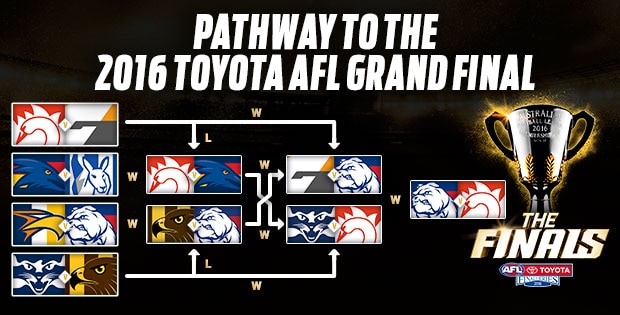THIS is the 'no excuses' Grand Final.
It is a match-up of two teams which have chosen to force themselves to win while others opted for easier, losing-mindset options or simply succumbed to the hottest pressure.
Rightful focus has been heaped upon the Western Bulldogs’ bravery amid adversity in 2016, but the Sydney Swans too have risen above certain situations which would have ruined rivals.
The easy, popular view to have of the Swans is that they have been gifted another Grand Final, their third in five seasons. Opponents refer to a questionable use of specially granted additional salary cap money, and more recently equally contentious access to gun kids in their academy.
But it is wrong to devalue their passage to tomorrow’s game, for it has been an extraordinary journey.
It was only two years when they were slapped with a trade ban when the AFL decided to penalise the club for simply working within the player-list rules they were given. So they were forced to make better the talent they already had.
Seven players made an AFL debut with the Swans in this Grand Final-reaching season. Traditionally, teams which blood that many players hide behind words like rebuild and re-set and refer to three and four-year plans and they tend to finish near the bottom of the ladder.
Eight of the Swans’ 22 who belted Geelong in last weekend’s preliminary final began their AFL lives as rookies. Of the same 22, eight boasted fewer than 50 games. No excuses being sought there, either.
The Sydney Swans lost three matches in the final 90 seconds in 2016, yet weren’t bothered with excuses that could have emerged from such disappointment, instead toiling away to win enough games to finish atop the ladder.
They were forced to play their “home” qualifying final at an “away” venue, and lost.
One of the keys to their forward line structure in the Grand Final is a diminutive 20-year-old, Tom Papley, who this time last year was working as an apprentice plumber.
Their captain, Kieren Jack, was subjected to a very public and sad family dispute, which would have broken lesser beings.
Ben McGlynn, despite all his personal heartache in failing to achieve a premiership, has never bothered with excuses, not even when he was stuck in the reserves team just a fortnight before the finals.
The Bulldogs’ adversity in 2016 has centred around the unfortunate season-ending injury to captain Bob Murphy. A key forward in Jack Redpath and key midfielder in Mitch Wallis have also endured serious injury.
Coach Luke Beveridge has never once even thought to make excuses around availability. Contrast that approach with North Melbourne’s woe-is-us attitude when its players started to drop mid-season.
Managing a $12 million debt could have crippled the Bulldogs’ ability to believe in blue skies. It didn’t. Nor did changing the CEO mid-season, or losing a key assistant coach thereafter.
Being forced to travel to Perth and Sydney for elimination and preliminary finals could have provided an excuse not to perform at optimum, as could the decision to take a massive risk in that first final with five underdone players.
An off-field punch-on between Zaine Cordy and Tom Boyd had the potential to destabilise. Instead it bonded. Cordy, with 10 games to his name, has been named at centre half-forward for the Grand Final; Boyd at full-forward.
Clay Smith doesn’t make excuses. Not after three knee reconstructions. Not after playing a preliminary final just days after the death of a close mate.
Luke Dahlhaus doesn’t make excuses, either. Not when he was playing for the reserve-reserves only six years ago, and again not when he suffered a knee injury this year.
When Beveridge walked into this club in late 2014, captain Ryan Griffen had just walked out. Brownlow medallist Adam Cooney and important forward Shaun Higgins also sought new football homes.
Beveridge never ventured even near making an excuse based on available talent.
His ability to propel this club to Saturday’s Grand Final is already AFL legend, no matter the result.



